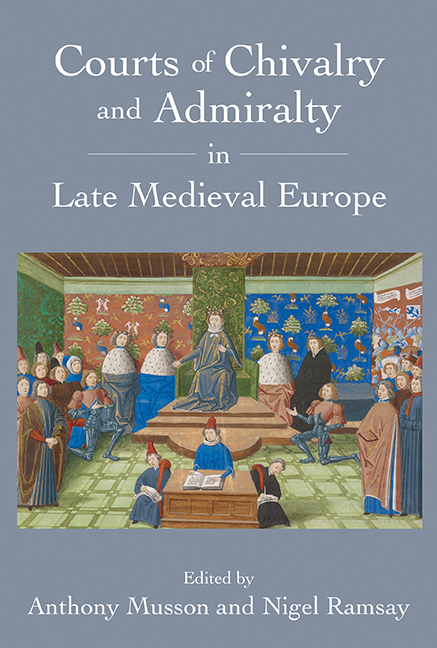Book contents
- Frontmatter
- Contents
- List of Illustrations
- Notes on Contributors
- Preface
- A Note on Editorial Practice
- List of Abbreviations
- Introduction
- Chapter 1 Heralds and the Court of Chivalry: From Collective Memory to Formal Institutions
- Chapter 2 French Armorial Disputes and Controls
- Chapter 3 Art, Objects and Ideas in the Records of the Medieval Court of Chivalry
- Chapter 4 Sir Robert Grosvenor and the Scrope–Grosvenor Controversy
- Chapter 5 From Brittany to the Black Sea: Nicholas Sabraham and English Military Experience in the Fourteenth Century
- Chapter 6 ‘Armed and redy to come to the felde’: Arming for the Judicial Duel in Fifteenth-Century England
- Chapter 7 The Jurisdiction of the Constable and Marshals of France in the Later Middle Ages
- Chapter 8 The Origins and Jurisdiction of the English Court of Admiralty in the Fourteenth Century
- Chapter 9 The Consulate of the Sea and its Fortunes in Late Medieval Mediterranean Countries
- Chapter 10 The Admiralty and Constableship of England in the Later Fifteenth Century: The Operation and Development of these Offices, 1462–85, under Richard, Duke of Gloucester and King of England
- Chapter 11 Some Dubious Beliefs about Medieval Prize Law
- index
Chapter 10 - The Admiralty and Constableship of England in the Later Fifteenth Century: The Operation and Development of these Offices, 1462–85, under Richard, Duke of Gloucester and King of England
Published online by Cambridge University Press: 28 June 2018
- Frontmatter
- Contents
- List of Illustrations
- Notes on Contributors
- Preface
- A Note on Editorial Practice
- List of Abbreviations
- Introduction
- Chapter 1 Heralds and the Court of Chivalry: From Collective Memory to Formal Institutions
- Chapter 2 French Armorial Disputes and Controls
- Chapter 3 Art, Objects and Ideas in the Records of the Medieval Court of Chivalry
- Chapter 4 Sir Robert Grosvenor and the Scrope–Grosvenor Controversy
- Chapter 5 From Brittany to the Black Sea: Nicholas Sabraham and English Military Experience in the Fourteenth Century
- Chapter 6 ‘Armed and redy to come to the felde’: Arming for the Judicial Duel in Fifteenth-Century England
- Chapter 7 The Jurisdiction of the Constable and Marshals of France in the Later Middle Ages
- Chapter 8 The Origins and Jurisdiction of the English Court of Admiralty in the Fourteenth Century
- Chapter 9 The Consulate of the Sea and its Fortunes in Late Medieval Mediterranean Countries
- Chapter 10 The Admiralty and Constableship of England in the Later Fifteenth Century: The Operation and Development of these Offices, 1462–85, under Richard, Duke of Gloucester and King of England
- Chapter 11 Some Dubious Beliefs about Medieval Prize Law
- index
Summary
It was unusual for the same man to combine the roles of Admiral and Constable, but it was a logical pairing. From 1462 to 1483 Richard, duke of Gloucester, was Admiral and from 1469 to March 1470 and from 1471 to 1483 he was Constable. The two decades were a time of change for both these offices: they were increasingly subordinated to the appointment by king and Council of specific commissions to deal with all matters of disorder and treason, whether on sea or land. When he became king, Richard III's experience in the two posts allowed him to make beneficial changes in the management of the Admiralty and navy and in effect to bring the role of the Constable to an end.
It is surprising that the earl of Warwick, Richard Neville, was not automatically made Admiral on Edward IV's accession, given his achievements as captain of Calais from 1456, and his ownership of a fleet sufficient to ensure that the king hardly needed to think of acquiring his own ships in the 1460s. He remained Keeper of the Seas, however, and was Warden and Admiral of the Cinque Ports and so had little practical need of the title. Edward IV appointed Warwick's uncle, William Neville, Lord Fauconberge and newly created earl of Kent, as Admiral on 30 July 1462, but only during the king's pleasure and coincidental to his command of a fleet to raid the French coast. This was a compliment to that useful and loyal noble and would not have offended Warwick. Richard of Gloucester can be understood to have had the title and profits of the office by 12 August and the formal appointment from 12 October 1462, while Neville went off on Edward's northern campaigns – where he died before the end of the year.
- Type
- Chapter
- Information
- Courts of Chivalry and Admiralty in Late Medieval Europe , pp. 195 - 222Publisher: Boydell & BrewerPrint publication year: 2018

